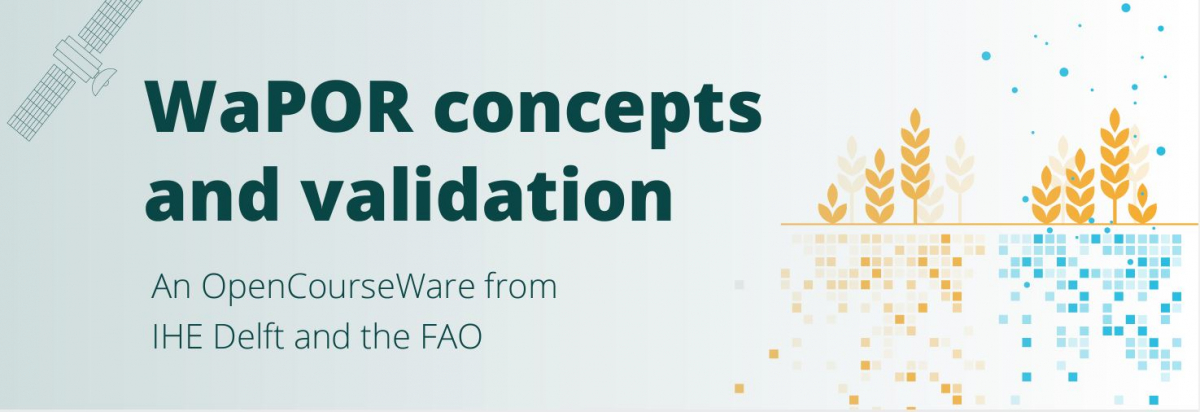MOOC WaPOR Concepts and Validation
This MOOC offered by IHE Delft and FAO was launched in June 2023!
IHE Delft Institute for Water Education and FAO have developed a new MOOC! This course aims to provide a better understanding of the theoretical concepts used to generate remote sensing based data on evapotranspiration and biomass production including their limitations. Specific attention will be given to the WaPOR database and how a systematic validation of the data can be done. The flyer can be downloaded here
Learning Objectives
Upon the successful completion of the course, the participants will be able to
- Explain the principles of thermal remote sensing and surface energy balance concepts
- Identify global ET data products and categorize the approaches used for producing them
- Explain WaPOR methodology and ETLook model
- Describe spatial and temporal attributes of WaPOR database inputs
- Explain the quality assurance cycle and the role of data validation
- Describe validation techniques and steps for WaPOR data products
- Calculate performance metrics to validate WaPOR data products (PCP, RET, AETI, NPP, biomass)
- Discuss the limitations and challenges of ET models and WaPOR database products
The course is organised into three modules:
- Module 1: “Concepts of remote sensing ET (energy balance, FAO-56 PM)”
- Module 2: “WaPOR database: structure, input data, and methods”
- Module 3: “Validation of WaPOR database products”
Important dates:
- 1 June 2023 registration open
- 15 June 2023 course open
The course is free to attend and is open to all who are interested. The course is self-paced and you can start any time. A reliable internet connection is required. A certificate of completion can be obtained after completing all assignments.
Target Group: Early and mid-career water professionals with a technical background and a strong interest in new techniques for water use monitoring.
Pre-requisites: Preferably a relevant water and/or environmental science (agriculture, remote sensing, geoinformation, geography, or any other relevant) degree; basic working knowledge of spatial data and analysis techniques. Recommendation to have finished module 1 of the MOOC on Water Productivity and Water Accounting using WaPOR before starting this course. Good command of the English language is required.
For fundamentals of remote sensing, the following free online courses are recommended:
Land in Focus – Basics of Remote Sensing
ARSET - Fundamentals of Remote Sensing
Registration
Steps to register/enroll yourself in this course:
Step 0. Have you already Created an Account in the IHE Delft Open Education homepage?
If you created an account in IHE Delft Open Education in the past, you can use the same Username and Password to log in. Then, go to Step 2 - Register/Enrol Yourself in the Course.
If you created an account in the IHE Delft Open Education in the past but forgot your password, click on “Forgot Password?”. Then, to reset your password, submit your Username or Email Address. An email will be sent to your email address with instructions on how to get access again. Once you have access to your Username and Password: (i) login into IHE Delft Open Education and (ii) go to Step 2 - Register/Enrol Yourself in the Course.
Step 1. Create a New Account in the IHE Open Education homepage: go to IHE Delft Open Education, click on Create New Account, fill in your Username, Password, etc. , an 'Account Confirmation' email will be sent to you, use the 'Web Address' received to confirm your new account and login using your Username and Password
Step 2. Register/Enrol yourself in the course: click on the title “OCW: WaPOR Concepts and Validation”, click on 'Enrol me in this course' (under the arrow in the upper right side/below your username), click on 'Enrol me' in the page 'Enrolment options' to complete the process (the course coordinator will send you a 'Welcome' email and your name will be listed as course participant).
This course has been produced in the framework of the second phase of the FAO WaPOR project.


